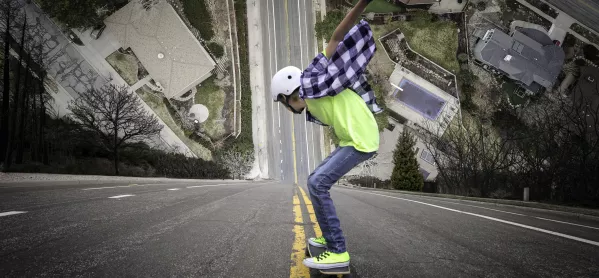Why we must show children tough love after Covid

Throughout my career in education, I have always tried to advocate for children. However, I felt powerless when it came to protecting children from their enforced seclusion during the Covid lockdown. And now, in a post-lockdown world, I’ve had to rethink my priorities.
It’s not easy being a parent. We want the very best for our children. We want to provide them with some of the things that we didn’t get when we were young. This is a natural instinct, but I think it’s also a dangerous one.
We are seeing an alarming rise in those who suffer from anxiety, depression and other stress-related illnesses. However, these increases were occurring long before the pandemic - the pandemic has simply brought them into even sharper focus.
Covid: What’s the secret to ‘catch-up’? Love
Wellbeing: 3 ways our school prioritises teacher wellbeing
A school leader’s view: True resilience means knowing when to give up
Quick read: How should we talk about resilience after the pandemic?
Also this week: Teachers a ‘trusted source’ on climate change, COP26 delegates hear
The question is why does childhood seem to be more difficult than it has ever been? I think the answer to that would probably take years of research and a 70,000-word thesis, but I have a sense that we parents may be to blame.
We’re making our children’s lives too comfortable, too safe, too clinical and too protected. We hate seeing them cry or suffer even small setbacks, and we do all that we can to avoid them failing.
By doing these things, we are actually failing them. We are not preparing our young for a world that is tough. We are not allowing them to develop resilience.
In 1981, as a cocky, self-assured teenager, I took nine O levels. I strolled into the headmaster’s office to hear my results from him some three months later, feeling self-satisfied. “Grant,” he said, “I think we can safely say that you have failed miserably to meet the moderate expectations we already held for you. You have achieved, if that is a phrase that accurately describes your performance, four passes and five fails.”
I left his office deflated, punctured, wounded; my self-esteem plummeted.
In such circumstances, I immediately wanted to speak to my mum and dad. I knew that they would offer me comfort, a shoulder to cry on and allow my excuses to soothe those pitiful examination results.
Mum: “Well, you obviously didn’t work hard enough. Serves you right.”
Dad: “You might as well leave school and come into the business. 4am starts, mind you.”
These simple responses catapulted me into achieving six Highers the following year.
My parents didn’t let me off the hook. They didn’t phone the school to complain that it was my teachers’ fault. They didn’t request an exceptional circumstances request because I had been unwell during the examination period. They basically said, “Suck it up and get on with it.”
I don’t think many of us parents would do that now. I know I try hard to be “tough”, but it’s desperately difficult.
As a society, we have all fallen into the trap of “comfort”, and now, we are paying the price. It’s not just children: adults are becoming ever more plagued by anxiety, stress, obesity, chronic fatigue or pain and myriad other debilitating effects - we all live in an increasingly sheltered, safe, overindulged, clinical environment.
It’s a hard message to hear but, we’re too soft, too forgiving, too quick to apportion blame elsewhere. We need to back off, allow kids to fail, to build up resilience, to understand that life isn’t always easy. If we don’t, we’ll end up with adults that cannot cope with adversity, who require support when facing any obstacle that comes in their way and they will fail to succeed. And it will be our fault.
I’m not suggesting no love, I’m suggesting grown-up, common-sense, thinking-ahead-to-the future love. That’s what my parents gave me - and thank God they did.
Rod Grant is headmaster at Clifton Hall School in Edinburgh. This is a version of a piece originally published on the school’s Facebook page
You need a Tes subscription to read this article
Subscribe now to read this article and get other subscriber-only content:
- Unlimited access to all Tes magazine content
- Exclusive subscriber-only stories
- Award-winning email newsletters
Already a subscriber? Log in
You need a subscription to read this article
Subscribe now to read this article and get other subscriber-only content, including:
- Unlimited access to all Tes magazine content
- Exclusive subscriber-only stories
- Award-winning email newsletters
topics in this article



